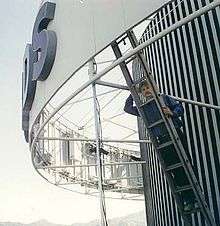John Wheeler (audio/video technologist)
John Henry Wheeler (born 1957 in Bristol, Tennessee) is an audio/video engineer, software developer, and creator of the Penteo surround-sound process for surround-sound channel extraction of music recordings for motion pictures. He has processed music for major films including Inglourious Basterds for Quentin Tarantino and Marvel's Watchmen. The process is now a Pro Tools plugin, which has been used in the forensic analysis and channel extraction of stereophonic music recordings for television post-production and motion picture soundtracks.
History
A teenager in the 1970s, John worked as an engineer and sound mixer in recording studios in his home state of Tennessee, as well as working to operate and repair record presses, boilers, and Phonograph Record manufacturing equipment.

John became a producer at Dallas-based TM Productions, where he co-produced radio station commercial jingles, sales presentations, and needle drop production libraries.
In 1985, he was hired as an audio engineer and music editor for Turner Production (TBS/CNN) in Atlanta, for the development of their stereo television efforts, and developed many techniques for live multi-location television remotes for "The Jason Project"[1] and the original 1986 "Goodwill Games" from Moscow. As a music editor, John needle drop scored several episodes of "World of Audubon" and Jacques Cousteau specials, and was responsible for editing most of the original theme music which appeared on CNN from 1985 until 1990.
In 1988, while at TBS, he won an audio engineering Emmy award for a promotion for the American version of "Letters from a Dead Man", a motion picture which Ted Turner purchased from Soviet Television for air in the U.S. on Turner Broadcasting.[2]
As a hobby, John was a C language programmer in MS-DOS and Unix, and became a database normalization design hobbyist. After Ted Turner's purchase of MGM in 1987, John developed a networked film library database system for Turner/MGM between operations in Culver City and Atlanta, using the tools of Informix Software on an SCO Xenix platform. In 1990, he was recruited to the San Francisco Bay Area as a technical services consultant for Informix.[3] Working for Informix, he spent three years developing one of the country's first real-time stock options trading systems at Group One[4] in San Francisco, in 1991 linking their floor traders in Chicago, New York, and Philadelphia and San Francisco using AppleTalk tunnelling through internet protocol via uunet to tie together local networks. At the time, the Internet was built primarily on the NSFNET; John asked for and received special permission to use the Internet for research use.
In the 1990s, he was brought in as Core Network Architect for Entertainment Digital Network (EDnet), a spinoff startup launched at Lucasfilm's Skywalker Sound in Marin County, California installing private real-time digital audio networks linking recording studios and motion picture audio post production facilities including Capitol Records studios, Sony Music studios, 20th Century Fox studios, A&M Records, and the home studios of Mariah Carey/Tommy Mottola, Robert Zemeckis, Phil Ramone, Walter Afanasieff, and Gloria Estefan for digital audio internetworking. He also co-engineered the telecommunications links for Phil Ramone for the Frank Sinatra "Duets" series.[5]
Retiring from EDnet in 1998, John spent two years as a field sound crew member on the TV show COPS, traveling across the US to shadow police officers for the show with a shotgun microphone.[6] In 2000, John joined NBC Universal as a Field News-gathering Engineer, covering major news events throughout the West.
In 2008, John started Penteo, LLC to develop and market the Penteo process. In 2010, Wheeler parted ways with the newly formed PenteoSurround, Inc., after he left company when control of the company was taken over by a group led by Tony Chapman.
In 2011, he joined ON24 in San Francisco as a broadcast standards compliance resource on hundreds of live, high-definition web events and conferences. Dejero Labs of Ontario, Canada recruited him in 2014, where he served as a Customer Needs Engineer for Dejero's network of television newsgathering units, using Channel Bonding over diverse cellular telephone carriers to replace and augment conventional microwave-radio-based newsgathering trucks.
After a 2 year sabattical, John joined the engineering staff of KRON-TV in San Francisco, where he works to develop and maintain new technologies for their 14-hour-per-day local news operation.
Personal life
John is the great-grandson of "Singing Bob Leonard", who, along with his cousin Flanders Bays were the traveling music teachers in churches and schools in Benhams and Maces Spring, Virginia, whose turn-of-the-century students included the Carter Family, pioneer contributors to the beginnings of country music from the Bristol Sessions recorded in John's hometown.
His parents died when he was a child; John was raised by "Singing Bob"'s son Thomas Leonard, a building contractor, who first taught him many aspects of music theory as a child using the shape note system, which had been used by his own father to teach students in the 1800s. Thomas also built him a home recording studio where, as a teenager, John learned his later craft.
References
- ↑ "Jason Learning | Education Through Exploration". Jasonproject.org. Retrieved 2014-06-08.
- ↑ NATAS 1988 Atlanta Emmy Awards
- ↑ CIO Magazine, January 1990
- ↑ "Group One Trading LP". Group1.com. Retrieved 2014-06-08.
- ↑ Album credit on CD liner.
- ↑ On screen credits.